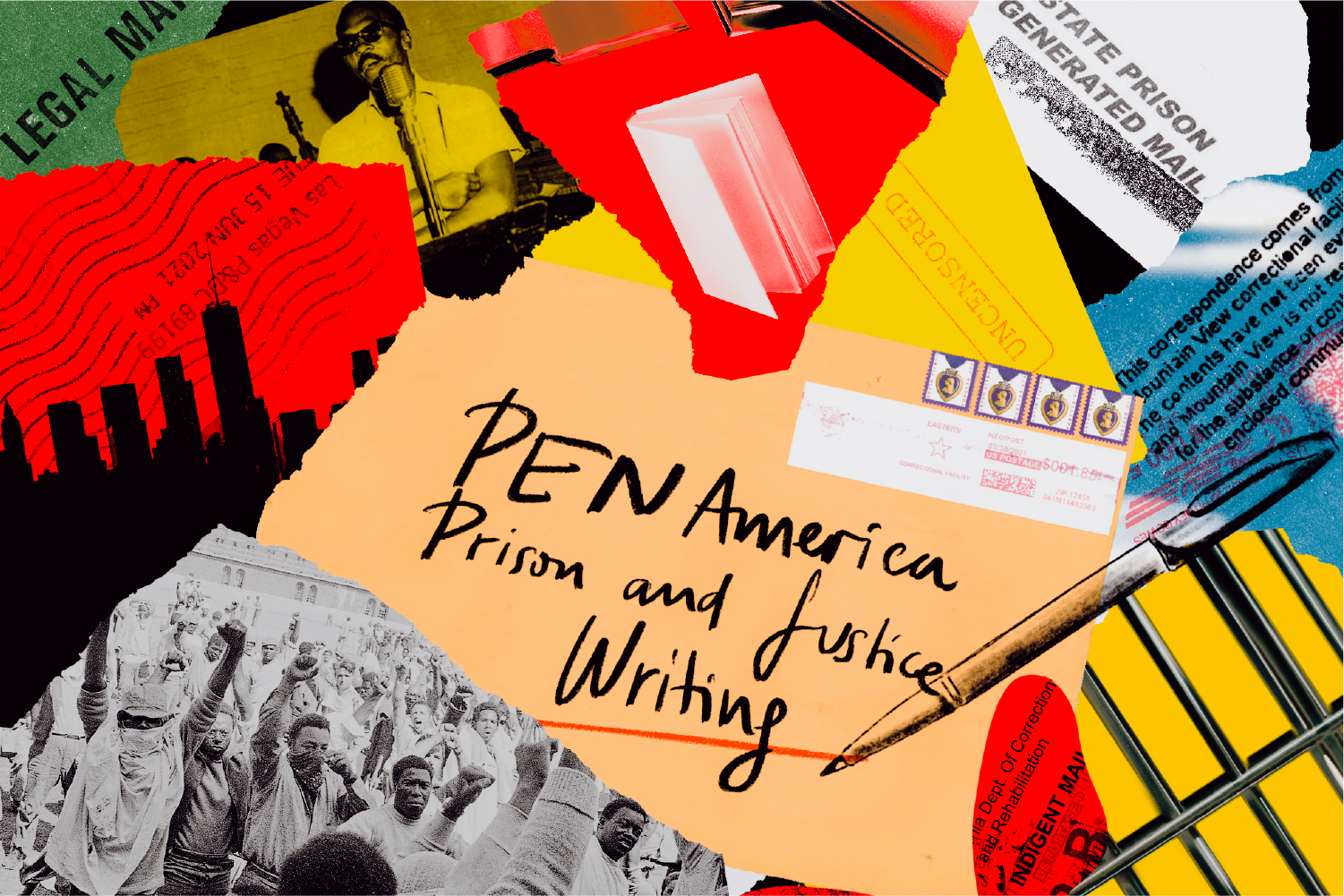PEN America’s Prison Writing Mentorship Program

It’s called a mentorship program, but it has prompted me to think about how it’s really a partnership, as we both exchange writing advice and build community.
– Cass Lewis on her work with Geneva Phillips for The Rumpus
The PEN Prison Writing Mentorship Program has been a pillar of the Prison and Justice Writing Program for nearly 50 years. Separated from the outside world, incarcerated writers face unique challenges to their emergence and careers as writers, journalists, and artists with valuable contributions. The PEN Prison Writing Mentorship Program aims to fill this gap by matching an incarcerated writer with a writer on the outside who has volunteered to read and respond to submitted work—a relationship similar to that of a writer and editor. The majority of mentees join the program through the annual PEN Prison Writing Awards, either as winners or by recommendation of the judging committee.
Through these pairings, writers receive feedback on new or existing work, support with crafting a writing practice and process, and, most importantly, a tether to literary communities outside prison walls. These exchanges are designed to be connective experiences, where reciprocal learning occurs between mentees and mentors. In this respect, the PEN Prison Writing Mentorship Program aims for participants to:
- Celebrate Different Perspectives
- Develop a Writing Practice
- Strengthen Literary Craft
- Explore New Methods of Storytelling
- Foster Connections with Literary Landscape
Lasting Impact
The impact of the PEN Prison Writing Mentorship Program often extends beyond the writing goals of its participants. Participating mentees who complete the correspondence cycle receive a certificate of completion. Previous participants have included this certificate—as well as other documentation of their work with PEN America—in dossiers for parole hearings.
The program also facilitates the cultivation of deep and enduring relationships between writers in prisons and those on the outside. These meaningful connections are honored through the annual PEN America/L’Engle Rahman Prize for Mentorship, which is named for the 10-year written friendship of the late acclaimed author Madeleine L’Engle and scholar, writer, and former Black Panther Party leader Ahmad Rahman. In his nomination essay, 2023 PEN America/L’Engle Rahman Prize winner Steven Perez writes about his impactful relationship with his mentor, Alison Harney:
One of the things I enjoy most about my relationship with Alison is her letters. Her letters are intense and filled with insight. The exchange of ideas and worldviews stimulates my mind… These types of conversations show me that in spite of all the lockdowns and all the other obstacles that come my way, my writing really does matter. It really does have the power to change people’s perspectives. It really does have the power to make changes for the better. These types of conversations show me that no matter what happens, I gotta keep writing.
-2023 PEN America/L’Engle Rahman Prize winner Steven Perez
Participants and Pairing
Mentees
The Prison and Justice Writing Program works with adult writers who are incarcerated in federal and state prisons, jails, and detention centers. Program participants are of all age groups, races, ethnicities, genders, ability, and educational backgrounds, and join a community of writers with diverse lived experiences and writing backgrounds. PEN America works with individuals regardless of the circumstances that led to their incarceration.
Mentors
The community of volunteers involved in the PEN Prison Writing Mentorship Program are writers and editors of all genres who have direct experience with teaching, conducting an editorial process, facilitating workshops, and/or have familiarity with the media, literary, and publishing landscapes. This program is not suited for high school and undergraduate students. Graduate students, in MFA programs or otherwise, are welcome to apply. Individuals with justice involvement are highly encouraged to submit a mentor application.
Pairing Process
Pairings are decided based on the experience, skills, and strengths of each mentee and mentor applicant. We also cross reference each mentee’s expressed goals and intentions from their onboarding survey to provide a supportive and enriching experience.
Due to the convoluted nature of sending mail to and from prison, as well as the increasing censorship practices and mail digitization, the PEN Prison Writing Mentorship Program is generally limited to writers who are recipients of the PEN Prison Writing Awards. Mentor applicants who are not paired for the upcoming cohort, may apply next year for the 2026-2027 mentorship cycle, and are encouraged to register for Works of Justice—PJW’s newsletter-based content series—to learn about future opportunities.
Please note that this is not a pen pal program. We support and admire the important work of pen pal programs and encourage those who do not fit the above criteria, or who don’t receive a pairing, to pursue those opportunities which are critical to mitigating the impact of isolation on the millions of people incarcerated in the US. Some of our favorites are Human Rights Pen Pals, Lifelines to Solitary, Black and Pink, pARTner project.
Mentor Engagement
PEN America facilitates most correspondence between mentors and mentees, with the expectation that mentors respond to each mentee communication within three weeks. Mentors are expected to correspond with mentees throughout the 10-month cycle, but are welcome to continue beyond that.
Throughout the cycle, the Prison and Justice Writing Program team will also host a variety of community-based sessions for volunteers, including an orientation, webinars, and other learning opportunities.
2025-2026 Tentative Timeline
Below are key dates for the 2025-2026 mentorship cycle. Some of these dates, such as the orientation, are subject to change based on internal and participant scheduling.
- June 1 – July 31, 2025: Mentorship application open
- November 19, 2025: Pairings confirmed
- December 4, 2025: Mentor Orientation (virtual)
- December 12, 2025: Correspondence cycle begins
- September 15, 2026: Correspondence cycle ends
Applications for the next cycle will open in the summer of 2026. Please contact the Prison and Justice Writing Program ([email protected]) with any questions.
Mentors who are currently paired and are in active correspondence need not reapply. However, previous applicants who remain unpaired should submit a new application.
